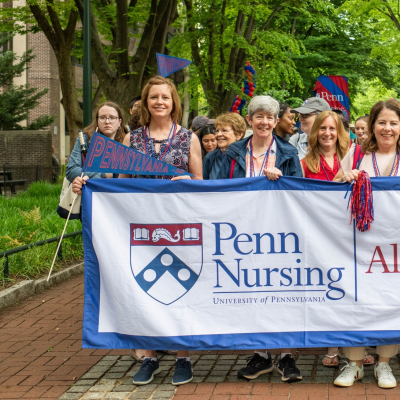Penn Collaboratory to Fund Ten New Pilot Studies on Aging
The Penn Artificial Intelligence and Technology Collaboratory for Healthy Aging (PennAITech) – made up of Penn’s School of Nursing, the Perelman School of Medicine, and other departments across the University – focuses on identifying developing, evaluating, commercializing, and disseminating innovative technology and artificial intelligence methods/software to support aging. This is year two for the collaboratory – made possible through a grant from the National Institute on Aging – and it is providing more than $2.3 M in funding to ten pilot projects.
December 04, 2023

This year’s awardees are:
- Pilot 1: Advancing Diagnostic Excellence for Older Adults through Collective Intelligence and Imitation Learning (Gary Weissman, University of Pennsylvania)
- Pilot 2: GlucoCheck: A Non-invasive & AI-assisted Blood Glucose Monitoring Device for Older Adults (Maria Valero, Kennesaw State University)
- Pilot 3: Real-time remote monitoring of confirmed medication adherence (Tony C Carnes, etectRx)
- Pilot 4: A speech-processing algorithm for automatic screening of African American patients with mild cognitive impairment and early dementia in home health settings (Maryam Zolnoori, Columbia University Medical Center and VNS Health)
- Pilot 5: A Device Free Wifi Sensing System to Assess Daily Activities and Mobility in Low-Income Older Adults with and without Cognitive Impairment (Jane Chung, Virginia Commonwealth University)
- Pilot 6: Non-Intrusive, Fine-Grained In-Home Daily Activity Transcription for Alzheimer’s Monitoring (Xinyu Zhang, University of California San Diego)
- Pilot 7: Fairness and Robust Interpretability of Prediction Approaches for Aging and Alzheimer’s Disease (Aidong Zhang, University of Virginia)
- Pilot 8: Talking tech with dementia care dyads: Improving a self-administered tool to support informed decision (Clara Berridge, University of Washington)
- Pilot 9: Prevention of Patch Poisoning in Elderly Alzheimer’s Patients (Sandeep Patil, Vaaji LLC)
- Pilot 10: Health App Review Tool: Connecting those Affected by Alzheimer’s to Needed Technology Support (Julie Faieta, University of Pittsburgh)
The Collaboratory Pilot Core invites applications for pilot studies using technology and artificial intelligence (AI) to optimize care management and health outcomes for all older Americans, including those with Alzheimer’s Disease and Related Dementias (ADRD) living independently, and those receiving clinical care or skilled home and community-based services.
The goals of this pilot program are to solicit, select and oversee pilot studies that design and test cutting edge technology to support aging and to foster collaborations among affiliated Penn investigators and a network of scientists and clinicians in peer institutions, research centers, industry partners and home and community-based services nationally.
“We are excited to see the PennAITech pilot portfolio grow with awardees that foster cutting edge solutions and innovation to make a difference for older adults and their families. Penn is uniquely poised to support them in this journey.” said George Demiris, PhD, FACMI, a Penn Integrates Knowledge Professor with joint faculty appointments in Penn Nursing’s Department of Biobehavioral Health Sciences, and the Department of Biostatistics, Epidemiology, and Informatics in Penn’s Perelman School of Medicine and one of the principal investigators of PennAITech.
Jason Karlawish, MD, Professor of Medicine, Medical Ethics and Health Policy, and Neurology, co-director of the Penn Memory Center and Associated Director, Alzheimer’s Disease Research Center, Perelman School of Medicine; and Co-Principal Investigator of PennAITech, added “We are looking forward to working with these Year 2 investigators to develop comprehensive and innovative solutions for aging that address not only technical but also clinical, ethical and policy implications.”








